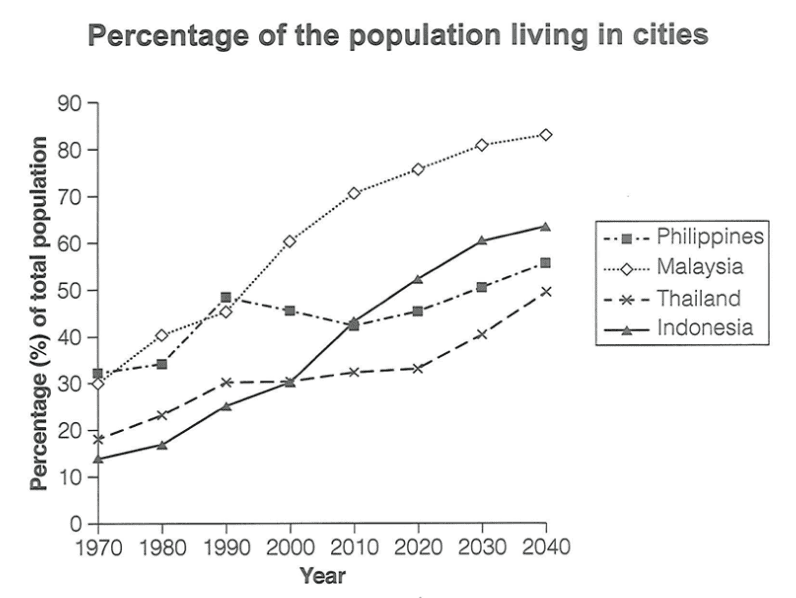The graph below gives information about the percentage of the population in four Asian countries living in cities from 1970 to 2020, with predictions for 2030 and 2040.
The line chart illustrates the proportion of urban population in four Asian nations between 1970 and 2020, with predictions to 2030 and 2040.
Overall, it is evident that all countries generally witnessed an upward trend in the percentage of people living in the cities over the 50-year period. Moreover, it can be seen that Malaysia experienced the highest figure, and all those trends will continue until 2040.
In 1970, the figures for Philippines and Malaysia were by far the highest, at around 30%, compared to that of Thailand and Indonesia, which was only 18% and 15%, respectively. After 30 years, while the percentage of urban residents in Philippines increased to around 50% and saw a decline in 2000, that of Malaysia went up to about 48%. Meanwhile, Thailand urban populations rose to 30% in 1990 and remained stable during the 20s. In contrast, populations living in cities in Indonesia climbed to 30% and surpassed the figure for Philippines in 2010.
By 2030, it is predicted that the percentage of urban populations in Malaysia surge to 80% and will become the nation which has the highest figure in 2040. Likewise, that of Indonesia is expected to see a growth to around 60% in 2040, whereas urban populations in Philippines and Thailand will stand at 55% and 50% in turn.
Summarise the information by selecting and reporting the main features, and make comparisons where relevant.
The line chart illustrates the proportion of urban population in four Asian nations between 1970 and 2020, with predictions to 2030 and 2040.
Overall, it is evident that all countries generally witnessed an upward trend in the percentage of people living in the cities over the 50-year period. Moreover, it can be seen that Malaysia experienced the highest figure, and all those trends will continue until 2040.
In 1970, the figures for Philippines and Malaysia were by far the highest, at around 30%, compared to that of Thailand and Indonesia, which was only 18% and 15%, respectively. After 30 years, while the percentage of urban residents in Philippines increased to around 50% and saw a decline in 2000, that of Malaysia went up to about 48%. Meanwhile, Thailand urban populations rose to 30% in 1990 and remained stable during the 20s. In contrast, populations living in cities in Indonesia climbed to 30% and surpassed the figure for Philippines in 2010.
By 2030, it is predicted that the percentage of urban populations in Malaysia surge to 80% and will become the nation which has the highest figure in 2040. Likewise, that of Indonesia is expected to see a growth to around 60% in 2040, whereas urban populations in Philippines and Thailand will stand at 55% and 50% in turn.

screenshot202306.png
